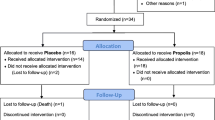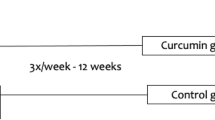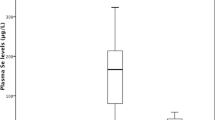Abstract
Ginsenoside Rb1 (GS-Rb1) is a well-known antioxidant derived from traditionally used herbal medicine ginseng. It has been suggested that reactive oxygen species (ROS) is involved in chronic kidney disease (CKD) in which GS-Rb1 may play a protective role. The aim of this study was to evaluate prospectively the effects of GS-Rb1 in patients with early chronic kidney disease. 197 patients who have been diagnosed with early CKD (stage 2 or 3) were recruited and randomly assigned to receive GS-Rb1 (500 mg daily oral administration, n = 103) or placebo (n = 94) for consecutive 6 months. Analytical procedures performed at baseline, the end of the treatments, and 6 months after the treatments included renal function evaluation (creatinine and urea clearance), oxidative stress measurement, inflammation assessment, and lipid profile. Of 177 patients completing the study, the GS-Rb1 group (n = 91) showed a positive response in significantly alleviating renal function impairments compared to the placebo group (n = 86). In addition, GS-Rb1 treatment was effective in reducing the extent of oxidative stress and inflammation in CKD patients, whereas continued deterioration was observed in the placebo group. Thus, extended treatment of patients using GS-Rb1 may present an antioxidant-based approach to slow the progression of CKD at the early stages.




Similar content being viewed by others
References
Bao HY et al (2005) Memory enhancing and neuroprotective effects of selected ginsenosides. Arch Pharm Res 28:335–342
Barton DL et al (2010) Pilot study of Panax quinquefolius (American ginseng) to improve cancer-related fatigue: a randomized, double-blind, dose-finding evaluation: nCCTG trial N03CA. Support Care Cancer 18:179–187. doi:10.1007/s00520-009-0642-2
Chen J, Siriki R (2015) Antioxidants therapy for patients with chronic kidney disease: a question of balance. Am J Nephrol 42:318–319. doi:10.1159/000441628
Coresh J et al (2007) Prevalence of chronic kidney disease in the United States. JAMA 298:2038–2047. doi:10.1001/jama.298.17.2038
Fogo AB (2007) Mechanisms of progression of chronic kidney disease. Pediatr Nephrol 22:2011–2022. doi:10.1007/s00467-007-0524-0
Fox CS et al (2012) Associations of kidney disease measures with mortality and end-stage renal disease in individuals with and without diabetes: a meta-analysis. Lancet 380:1662–1673. doi:10.1016/S0140-6736(12)61350-6
Go AS, Chertow GM, Fan D, McCulloch CE, Hsu CY (2004) Chronic kidney disease and the risks of death, cardiovascular events, and hospitalization. N Engl J Med 351:1296–1305. doi:10.1056/NEJMoa041031
Hasegawa H (2004) Proof of the mysterious efficacy of ginseng: basic and clinical trials: metabolic activation of ginsenoside: deglycosylation by intestinal bacteria and esterification with fatty acid. J Pharmacol Sci 95:153–157
Jun M et al (2012) Antioxidants for chronic kidney disease. Cochrane Database Syst Rev 10:CD008176. doi:10.1002/14651858.CD008176.pub2
Komishon AM et al (2016) The effect of ginseng (genus Panax) on blood pressure: a systematic review and meta-analysis of randomized controlled clinical trials. J Hum Hypertens. doi:10.1038/jhh.2016.18
Kwan BC, Kronenberg F, Beddhu S, Cheung AK (2007) Lipoprotein metabolism and lipid management in chronic kidney disease. J Am Soc Nephrol 18:1246–1261. doi:10.1681/ASN.2006091006
Lee HU, Bae EA, Han MJ, Kim NJ, Kim DH (2005) Hepatoprotective effect of ginsenoside Rb1 and compound K on tert-butyl hydroperoxide-induced liver injury. Liver Int 25:1069–1073. doi:10.1111/j.1478-3231.2005.01068.x
Levey AS, Bosch JP, Lewis JB, Greene T, Rogers N, Roth D (1999) A more accurate method to estimate glomerular filtration rate from serum creatinine: a new prediction equation. Modification of diet in renal disease study group. Ann Intern Med 130:461–470
Levey AS et al (2005) Definition and classification of chronic kidney disease: a position statement from kidney disease: improving global outcomes (KDIGO). Kidney Int 67:2089–2100. doi:10.1111/j.1523-1755.2005.00365.x
Levey AS et al (2006) Using standardized serum creatinine values in the modification of diet in renal disease study equation for estimating glomerular filtration rate. Ann Intern Med 145:247–254
Liu ZQ, Luo XY, Liu GZ, Chen YP, Wang ZC, Sun YX (2003) In vitro study of the relationship between the structure of ginsenoside and its antioxidative or prooxidative activity in free radical induced hemolysis of human erythrocytes. J Agric Food Chem 51:2555–2558. doi:10.1021/jf026228i
Liu X et al (2012) Ginsenoside-Rd improves outcome of acute ischaemic stroke—a randomized, double-blind, placebo-controlled, multicenter trial. Eur J Neurol 19:855–863. doi:10.1111/j.1468-1331.2011.03634.x
Meguid El Nahas A, Bello AK (2005) Chronic kidney disease: the global challenge. Lancet 365:331–340. doi:10.1016/S0140-6736(05)17789-7
Nagatomo F, Fujino H, Kondo H, Ishihara A (2012) Oxygen concentration-dependent oxidative stress levels in rats. Oxid Med Cell Longev 2012:381763. doi:10.1155/2012/381763
Nangaku M (2006) Chronic hypoxia and tubulointerstitial injury: a final common pathway to end-stage renal failure. J Am Soc Nephrol 17:17–25. doi:10.1681/ASN.2005070757
Nugent RA, Fathima SF, Feigl AB, Chyung D (2011) The burden of chronic kidney disease on developing nations: a 21st century challenge in global health. Nephron Clin Pract 118:c269–277. doi:10.1159/000321382
Okada K, Yanai M, Takeuchi K, Matsuyama K, Nitta K, Hayashi K, Takahashi S (2014) Sex differences in the prevalence, progression, and improvement of chronic kidney disease. Kidney Blood Press Res 39:279–288. doi:10.1159/000355805
Radad K, Gille G, Liu L, Rausch WD (2006) Use of ginseng in medicine with emphasis on neurodegenerative disorders. J Pharmacol Sci 100:175–186
Sahni N, Gupta KL, Rana SV, Prasad R, Bhalla AK (2012) Intake of antioxidants and their status in chronic kidney disease patients. J Ren Nutr 22:389–399. doi:10.1053/j.jrn.2011.09.002
Small DM, Coombes JS, Bennett N, Johnson DW, Gobe GC (2012) Oxidative stress, anti-oxidant therapies and chronic kidney disease. Nephrology (Carlton) 17:311–321. doi:10.1111/j.1440-1797.2012.01572.x
Vanholder R, Massy Z, Argiles A, Spasovski G, Verbeke F, Lameire N, European Uremic Toxin Work G (2005) Chronic kidney disease as cause of cardiovascular morbidity and mortality. Nephrol Dial Transplant 20:1048–1056. doi:10.1093/ndt/gfh813
Vaziri ND (2004) Roles of oxidative stress and antioxidant therapy in chronic kidney disease and hypertension. Curr Opin Nephrol Hypertens 13:93–99
Vogler BK, Pittler MH, Ernst E (1999) The efficacy of ginseng. A systematic review of randomised clinical trials. Eur J Clin Pharmacol 55:567–575
Vuksan V et al (2008) Korean red ginseng (Panax ginseng) improves glucose and insulin regulation in well-controlled, type 2 diabetes: results of a randomized, double-blind, placebo-controlled study of efficacy and safety. Nutr Metab Cardiovasc Dis 18:46–56. doi:10.1016/j.numecd.2006.04.003
Wu Y et al (2011) Protective effect of ginsenoside Rb1 against myocardial ischemia/reperfusion injury in streptozotocin-induced diabetic rats. Mol Biol Rep 38:4327–4335. doi:10.1007/s11033-010-0558-4
Xia R, Zhao B, Wu Y, Hou JB, Zhang L, Xu JJ, Xia ZY (2011) Ginsenoside Rb1 preconditioning enhances eNOS expression and attenuates myocardial ischemia/reperfusion injury in diabetic rats. J Biomed Biotechnol 2011:767930. doi:10.1155/2011/767930
Yin J, Zhang H, Ye J (2008) Traditional chinese medicine in treatment of metabolic syndrome. Endocr Metab Immune Disord Drug Targets 8:99–111
Yokozawa T, Liu ZW, Dong E (1998) A study of ginsenoside-Rd in a renal ischemia-reperfusion model. Nephron 78:201–206
Zachara BA (2015) Selenium and selenium-dependent antioxidants in chronic kidney disease. Adv Clin Chem 68:131–151. doi:10.1016/bs.acc.2014.11.006
Zhang JM, Matsuura Y, Sueda T, Orihashi K (1999) Beneficial effects of ginsenosides of stems and leaves on cardiac and coronary vascular functions after 12-hour rat heart preservation. Transplant Proc 31:2175–2178
Author information
Authors and Affiliations
Corresponding author
Ethics declarations
Conflict of interest
The authors declare that they have no conflict of interest.
Research involving human participants
All procedures performed in studies involving human participants were in accordance with the ethical standards of the institutional and/or national research committee and with the 1964 Helsinki declaration and its later amendments or comparable ethical standards.
Informed consent
Informed consent was obtained from all individual participants included in the study.
Funding
This work was funded by Developing Medicine Funds.
Rights and permissions
About this article
Cite this article
Xu, X., Lu, Q., Wu, J. et al. Impact of extended ginsenoside Rb1 on early chronic kidney disease: a randomized, placebo-controlled study. Inflammopharmacol 25, 33–40 (2017). https://doi.org/10.1007/s10787-016-0296-x
Received:
Accepted:
Published:
Issue Date:
DOI: https://doi.org/10.1007/s10787-016-0296-x




